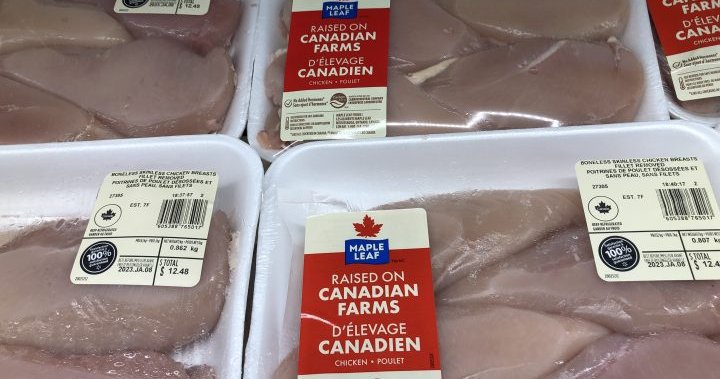- cross-posted to:
- [email protected]
- cross-posted to:
- [email protected]
The federal government is calling for input from grocers, food and beverage producers, provincial governments and the general population.
Wish they would go after companies that produce millions upon millions of tonnes of plastic bullshit. I’m not sorry if you created some widget, gadget, toy and it’s soul purpose is to be an injection molded happy meal 5 minute amusement piece. Capitalism… blah blah yeah yeah I know. A shift needs to happen.
While the plastic gadgets are wasteful, they don’t hold a candle to all the unnecessary food packaging that’s used. Just tear apart one of your garbage bags, and see how much is food-related packaging and how much is gadgets.
I visited the US (WV) recently, and I was appalled by how much waste goes unrecycled. At home (Europe) our family produces one bag of unrecycled waste every 2 weeks, in WV we produced 6 bags in 2 weeks, and that’s while living in European style (refillable water bottles, declining plastic bags for groceries, buying unpackaged produce, etc.).
Nearly every food item on the shelf has plastic. Aluminum cans are lined with plastic on the inside, glass bottles have a plastic freshness seal/cap. Even pasta boxes, one of the few cardboard packaged goods that don’t have an inner plastic liner often have a little plastic window so you can see what the pasta looks like.
And yet we’re being told that plastic bags are the problem. Literally the only plastic thing you get from the grocery store that isn’t single use. Instead we have paper bags which are bulkier and have a higher carbon footprint, and we still end up with a bunch of actually single use plastic bags because we no longer have anything to use as small garbage bags.
The carbon foot print is debatable, but plastic in the environment is basically there forever, where a paper bag breaks down relatively quickly and natural processes can deal with cellulose.
I’d moved into a house and noticed a plastic bag stuck on a branch high up on a tree. When I moved 11 years later, the bag was still there, showing essentially no signs of deterioration, even after 11+ years of exposure to sunlight and seasons that vary from -35C to +35C.
Paper bags can be used as garbage bags as long as the garbage isn’t soup. Mum did it back in the 1960s and 1970s until plastic bags replaced the traditional paper bag. We’re both back to using paper bags for garbage.
The last plastic bags that my grocery store used were so thin that they almost always had holes in them and leaked, so there weren’t appreciably better in that respect than paper.
I’m old enough to remember that grocery store only had paper bags, and replaced them with plastic bags because we were using too much paper and it was killing all the trees.
Now we’re back to paper bags…
That was a lie. I worked in groceries back in the 90s and the store owner said that the paper sacks cost him 5 cents and the plastic bags were less than 1 cent each… So stop handing out paper unless people ask for it!
I did not know that. I was a kid in the 1970s/80s when the change came to the part of Canada I grew up in… and I remember it as a “too many trees chopped down” thing. Did some digging and… damn…
Yeah, greenwashing is a huge thing. Most everything corporations do for “the environment” is bullshit used to place the problems on the individual consumers and not the actual perpetrators. Companies only care about that money.
That was a marketing campaign by the petrochem industry to get plastic bags into stores, and it worked.
BRING BACK PAPER! I have textbooks to cover with doodles on brown paper.
No one gives a shit about the carbon footprint of bags. It’s negligible.
What matters is the amount of waste produced, and a sizable chunk of that IS made up of bags.
@nathris @Ondergetekende Until it closed a few months ago we had a Zero-Waste bulk food store in town and it was where I got a majority of my non produce items: pasta, dried beans, lentils, nooch, bulk spices. (and they were the only place in town with vean meat alts in bulk like Byond and Impossible).
As a fall-back we go to the regular Bulk Barn type place it has a wider selection and thankfully have started allowing tared u-bring containers again.
Its bit of an art being zero-waste.
The Bulk Barn’s near me have “Sustainable Sundays”, and you get 15% off on products you get in your own containers.
@Grimpen Thata excellent, gotta see if my locals have that!
Definitely a good idea to reduce plastic waste, but I think that putting too much emphasis on grocery packaging can miss the mark. For things like food, it is important to be able to have things sealed for freshness or food safety. The unnecessary waste in my mind comes more from things like packaging of other products, like showy retail clamshell packaging that’s significantly larger than the item being sold, or that only exists as a marketing gimmick to make things look good on retail shelves.
A good model is some things from Amazon that just gets shipped in plain cardboard because that’s more recyclable/renewable than plastic. I also feel that the efficiency of having large warehouses, even when the items are shipped individually is better than having to have a whole retail supply chain that involves creating an appealing retail space. Especially if someone is making a trip in a vehicle to pick up just a couple retail items. Another good example is something like the Lee Valley model where many items don’t have significant packaging at all, and they use a smaller show-room style retail space supplemented by more efficient warehousing storage in the back. Lee Valley even has a program to collect and re-use shipping boxes so they can be directly used multiple time before getting put through a recycling process.
In a lot of ways, it’s up to the consumer to make buying choices based on the sustainable practices of the business they choose to frequent. Just blaming the business for the waste created by the service that their customers choose to use is just kicking the can down the road. If we chose to shop at businesses with sustainable practices or buy products with more sustainable packaging it would create a clear financial incentive for other businesses to follow suit.
on the sunshine coast, we introduced composting service. my family of three produces about one large bag every 2 weeks (plus extras due to ongoing renos). it made a huge difference!
Yes please. Once you take composting and recycling seriously you realize that your garbage can only contains those stupid styrofoam packagings
I don’t even need to do any recycling or composting. Just open my fridge, it is all plastic with a few glass bottles.
Some plastic is recyclable. Not sure what you’re getting at.
Nominally, but really plastic just doesn’t want to be recycled and the end product is inferior. It’s a polymer, there’s no way to move those giant molecules around without breaking them a bit.
And of course, there’s a lot of plastics that just straight up have to be landfilled.
You really should thought
Reject modernity, go back to butcher paper!
The sheer amount of plastic waste created before it reaches the customer is far worse… Tons of shrink wrap and Styrofoam filling the garbage bins of every store and we’re worried about the little plastic window in your box of pasta. This is just straws and shopping bags again and again; no meaningful change and even worse is that it makes people think something’s being done so they don’t look too deep.
Can we stop complaining about progress?
Yes, you’re right, there are bigger issues. Doesn’t mean we can’t celebrate the small victories. Any and all waste reduction is a good thing.
I think what they’re worried about is sort of like giving a hypothermic person hard alcohol to “warm” them up. It masks the real problem and can result in real harm. If we get caught up in these small victories , which I agree are good, we may lose sight of some of the heavy lifting we need to do to make real change. Many corporations rely on misdirection and topic fatigue to keep from having to do anything of real substance.
I agree with you but I also think the large companies seem to always get away with this and it’s the consumers that have to do all the work.
How much per unit though? Like if a skid with a thousand boxes of doodads is super-shrinkwrapped, yes when you cut off the wrap it’s a lot but how much wrap per doodad?
It of course depends on the product. Clothing tends to be individually wrapped for example. Some foods are actually not too bad because they come in a big box or crate. Manufacturing creates a good bit. Some places use way more plastic than they ever used to; look at how silage bales are done these days. There’s also the tons of stuff thrown away by stores instead of being discounted or donated; it’s of items that are returned just go straight to the bin, never mind seasonal items that are just disposed of.
My point is we keep putting the target on the little things that are more visible, the danger being that this makes the public perception of the progress made inaccurate and is sort of a “green washing” diversion.
Extended producer responsibility FTW.
Good. If you go through my landfill garbage, food packaging plastic is basically everything in there (I have compost pickup where I live). Most of it is highly unnecessary.
It’s dumb we use our ultra-permanent wonder material for our most temporary items. It’s only a thing because we effectively subsidise the waste disposal.
Wait. You mean to tell me that a plastic bag of milk, bagged with other plastic bags of milk, bagged in yet another plastic bag at checkout isn’t a good idea?
Just wait till you see how all this stuff is shipped to the grocery store. In a box with a plastic bag inside, on a palette wrapped in plastic,
Those trays in the photo. Are they still used in Canada? They’ve been gone for years in the UK.
Yup, they’re ubiquitous around here.
Some styrofoam, some blow-molded plastic trays.
And the juice absorbing liner is always plastic, too.
Remember when the pre-grated Parm cheese came in the paper cylinder with a paper top with a metal spout? Like salt still is sometimes?
Remember when coffee beans came in paper bags and things like Oreos or keebler cookies came in corrogated paper sleeves with printed paper overwraps? Remember bread in paper bags? Why does gum now come in blow-molded cups?
You can’t even find rolls of wax paper anymore! It’s not the .1 mil wrap on ground meat that’s the real problem.
Taxes and regulations on the petrochemical companies are at all time lows and that lets the rest of these grocery companies get greedy and penny pinch their way to stockholder satisfaction and quarterly bonuses.
You can complain about consumer-end plastic all you want but it won’t stop until you cut it off at the source. When you hear, “Drill baby drill!” they’re not doing it for just your car (which incedently is also a huge source of plastic waste.) Hydrocarbon conglomerates are the source of all this nonsense.
But what are you going to do? 1. Be nice to your neighbors and Walk or ride your bike or 2. persecute minorities and immigrants and buy huge new SUVs every other year like the Tv tells you to?
🥽
Yet more environmental performance art that doesn’t have a significant impact on actual waste. I wonder when the backlash will start, potentially putting us in a worse state than where we started? I’m plenty pro-environment, but my city just forced all the restaurants to charge 15 cents for each paper bag they put food in when you go through a drive through and I can easily see something like that getting on peoples’ nerves. I bought a small portable cooler to keep in the car so I don’t have to pay that fee and the amount of plastic that went into it is huge, so it’s already a counterproductive rule from a practical sense.
Hot take: when an F-350 idles in a Wendy’s drive through for 5-10 minutes to get a burger, fries and drink all in their own container, the recyclable/compostable paper bag to hold it all together probably isn’t the problem. But that’s just a guess.
Then go after both problems?
Big cities in Canada should also charge inefficient vehicles operating within urban centers (downtown Vancouver, Toronto, Montreal). In other places, this is enforced by license plate registration and discourages the operation of inefficient vehicles within downtown urban areas.
My friend, I think towns and cities shouldn’t have personal motor vehicles at all.
Then you don’t need the take out bag at all, you just eat it in the restaurant, or bring your own bag from home, or consignment like cans and bottles.
I’m more concerned about the implementation of the 15¢ paper bag charge. It feels like green washing to me, and i think the administration of the charge will likely net very little out of the fee to put towards other projects. But that’s just a feeling, there’s no data supporting it.
Do retailers pay the fee when they buy the bags in bulk? Do they reimburse the municipality for each bag sold? What about spillage/bad bags? Is this fee specifically being set close enough to plastic so people return to those?
Regardless, the problem isn’t actually the bag (not even the plastic ones) the problem is that they are only used once. A nominal fee is unlikely to change that. A consignment fee is more likely to change it (worked pretty well for cans and bottles).
My friend, I think towns and cities shouldn’t have personal motor vehicles at all.
It’s a radical take that has no political legs, but if you replaced every car seat with a bus seat in a major city it would just be awesome. No traffic, and no wait times (including unnecessary stops) because that’s a lot of buses. Not to mention a fraction of the emissions.
A diesel bus runs 20-30 L/100km.
A Toyota Prius runs 5 L/100km.
Average car occupancy is 1.2 people.
Break even for a single bus is like 5 Priuses. So a city that has 500,000 car commuters a day would be carbon neutral to swap them with 100,000 busses.
That’s a lot of bus routes for a city of a million+ people.
Or a town of 20,000 car commuters would be served with 4,000 bus routes. Not bad for a town under 100,000 people.
Thank you for doing the math!
Indeed. And just because I was feeling snarky and annoyed about the 15 cent charge, I asked for extra napkins one time and they gave me enough extra paper napkins to easily have made a paper bag out of. The burger comes in its own cardboard box. The fries have their own cardboard box. It’s such a silly and pointless thing that’s clearly just being done so that they can say they’re “doing something.”











